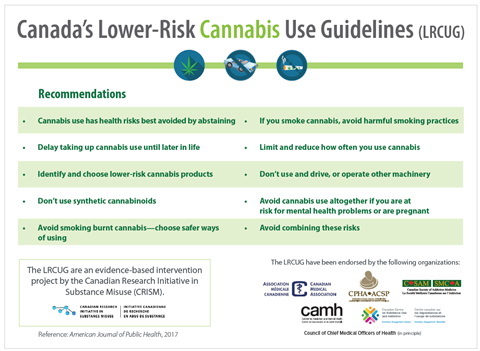Public health guidelines aim to lower health risks of cannabis use

Canada's Lower-Risk Cannabis Use Guidelines, released today with the endorsement of key medical and public health organizations, provide 10 science-based recommendations to enable cannabis users to reduce their health risks. The guidelines, based on a scientific review by an international team of experts, are published in the American Journal of Public Health.
The guidelines address the fact that, despite the health risks of cannabis use, the rate of cannabis use in Canada is among the highest in the world. More than 10 per cent of adults and 25 per cent of adolescents report cannabis use over the past year. The health risks range from problems with memory and physical coordination, to motor vehicle accidents and mental health or dependence problems.
As Canada moves towards legalization with the introduction of the federal Cannabis Act, it provides an opportunity not only to regulate the use and supply, but also to educate and inform cannabis users to prevent or reduce cannabis-related health problems.
"Factual, science-based information can provide guidance to cannabis users to make choices that reduce both immediate and long-term risks to their health," says Dr. Benedikt Fischer, Senior Scientist at the Centre for Addiction and Mental Health (CAMH), who led the development of the guidelines. They are a project of the Ontario site of the Canadian Research Initiative on Substance Misuse (CRISM), a national initiative funded by the Canadian Institutes of Health Research.
"Cannabis use carries with it real health risks, and mitigating those risks for Canadians - particularly young Canadians - must be the first priority," says Dr. Laurent Marcoux, President-Elect of the Canadian Medical Association (CMA). "The CMA continues to recommend a broad public health policy approach focused on preventing problematic drug use; ensuring the availability of assessment and treatment services for those who wish to stop using; and harm reduction to increase the safety for those who are using."
While the first guideline recommendation is to abstain from cannabis use to avoid all risks, the remaining recommendations address the elevated potential of risks related to initiating use at a young age, high potency products, alternative delivery systems, heavy use and driving, as well as identifying people at higher risk of problems - with concrete recommendations for risk reduction in each case.
"These guidelines are an important tool supporting a public health approach to cannabis use," says Ian Culbert, Executive Director of the Canadian Public Health Association. "People who use cannabis and cannabis-derived products, front-line practitioners, and public health professionals can all benefit from having access to evidence-informed guidelines that can help reduce the potential negative health effects associated with cannabis use. Through their widespread adoption, the guidelines will provide people who use cannabis with the information they need to manage their use and protect their health and well-being."
The other organizations endorsing the guidelines are the Canadian Society of Addiction Medicine, the Canadian Centre on Substance Use and Addiction, and CAMH. ?
"Given the many people, especially young people, who use and may be harmed by cannabis use, we are pleased to recommend this evidence-based harm-reduction guidance to Canadians who do choose to use cannabis," says Dr. David Allison, Chief Medical Officer of Health for Newfoundland and Labrador, speaking on behalf of the Council of Chief Medical Officers of Health. "This document is a welcome addition to our tool box for protecting and promoting the health of Canadians."
Using scientific evidence as the basis for public guidelines is similar to existing public health initiatives for low-risk drinking, or safer sexual behaviours to avoid infection or unwanted pregnancy.
In addition to the scientific paper, the guidelines are available as a public brochure for users and an evidence summary for health professionals.


















